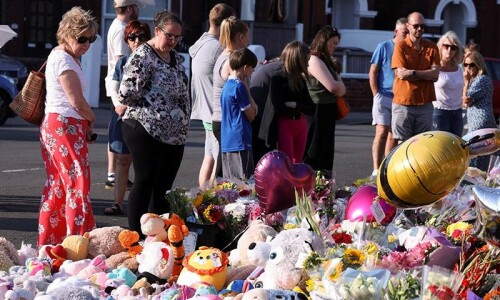
IN some parts of Liverpool, life is as normal as ever. At Lime Street train station, tourists come and go, discussing the cooler weather this week compared to last week’s heatwave. On local buses, passengers chat about recent trips or upcoming holidays, seemingly unaffected by the recent violence — the worst wave of riots in the country in about 13 years.
Merseyside Police reported 33 arrests following the far-right riots on County Road, which resulted in looting of shops, torching of Spellow Library, a community hub, and attacks on police officers, some of whom were hospitalised.
Muslims in the city, however, are on alert and fearful. One hijab-wearing young woman at the train station told Dawn, “My family and I are visiting from Oman and after reading reports on the violence we contacted the consulate to see if we can venture out. Thankfully, we were able to see the city and have been safe.”
The English Defence League (EDL) — a far-right group known for its anti-immigrant and anti-Muslim stance — is reportedly behind the violent riots. The EDL has leveraged social media to incite and provoke locals in Southport, Manchester, Bolton, and Liverpool, fueling the unrest.
Various locations have been targeted, including mosques, hotels accommodating asylum seekers, and a library that also functions as a community foodbank. Online discussions on accounts sympathetic to the EDL are causing concern. One user commented, “We no longer feel safe in Tamworth due to illegal men.” Another user expressed frustration, stating, “We requested Ukrainian migrants but received an influx of Middle Eastern men instead.”
Even those condemning the violence often echo the anti-Muslim and anti-migrant sentiments perpetuated by groups like the EDL.
“I can understand why these people are so angry. Over the years, community spaces that used to be where different people can interact have just deteriorated and are in bad shape due to lack of funds. So to them, migrants are aliens. Still, violence is never the answer,” said one taxi driver said.
The normally welcoming iron gates of the mosque are now sealed shut, secured with a metallic chain wrapped between the bars. Access is restricted to worshippers during prayer times only. Two men in high-visibility jackets, deployed by the Home Office as part of enhanced security measures, stand guard at the entrance. Due to its popularity, the mosque is considered a vulnerable target for far-right groups.
A similar anxiety is palpable at the Abdullah Quilliam Society mosque in Brougham Terrace. The mosque is famous with tourists for being the country’s first. It is also frequented by new converts to Islam. But not this week.
Access restricted
Outside the mosque, lone worshiper Aidan says, “It’s a shame. I was born and bred in Manchester. You think over the years, the more people sort of get to recognise Islam, and any religion in particular, that they become more accustomed to it. To see these things happening and telling my kids to be careful now when they go out. We are more aware today that this hatred exists. As a parent, that is scary.”
At the Al-Rahma mosque, which serves nearly 4,000 Muslims every Friday, secretary and trustee Muhammad Mahyoub talks about the shock of the riots.
“We weren’t expecting these riots. They came as a total shock. These people should be designated terrorists because they terrorised people. As a member of the committee in the mosque as well as a member of the local community, I speak to a lot of people. We never thought this could happen here,” he told Dawn.
Mahyoub said last week’s violence was triggered by different factors, but the recent elections also had played a part.
“During every election, politicians on all sides feel they must hit out at immigrants and target the Muslim community to get votes — and they do it because they get away with it. After elections, they think of sweet-talking Muslims and many of us are happy to get a mention in a press release. But we know that actions speak louder than words.”
When asked if the increased security measures and Prime Minister Keir Starmer’s assurances that Muslims will be protected and perpetrators punished bring any comfort, Mahyoub said, “…It won’t fix the problem in the long term. This might be a reactive action, but why wait until the attack comes? What does it mean to have better security in a building when our people feel scared to walk in? I appreciate the support for mosque security, but it addresses only 1pc of the overall problem.”
Published in Dawn, August 6th, 2024














































Dear visitor, the comments section is undergoing an overhaul and will return soon.